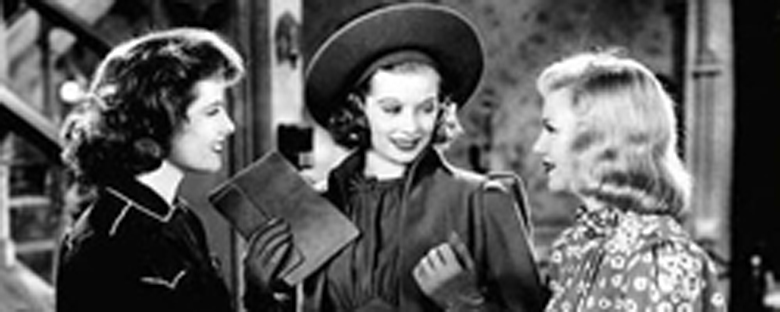Reviews
Gregory La Cava
USA, 1937
Credits
Review by Beth Gilligan
Posted on 04 March 2005
Source Warner Bros. DVD
Fresh off the success of My Man Godfrey, director Gregory La Cava took a break from screwball fizz, setting his sights on a stage play by Edna Ferber & George S. Kaufman. The play, Stage Door, chronicled the ups and downs of a group of aspiring actresses living in a dingy New York boardinghouse, a world far removed from the dilettantes and forgotten men who populated Godfrey. Still, the earlier movie’s rapid-fire dialogue and comic punch seem to have left their imprint on the director, who wisely lets the tart exchanges between the girls take center stage most of the time.
Although Stage Door slows down a bit in its maudlin second act, La Cava makes the most of the play’s witty lines in the beginning. Katharine Hepburn, playing what essentially amounts to a watered-down version of herself, is allowed the movie’s richest material, but it is Ginger Rogers who all but steals the show. While her name may forever remain linked with Fred Astaire’s, Rogers’ skills reached far beyond the ballroom; the prodigious comedic gifts displayed here hint at a talent that would remain largely untapped for the rest of her career.
Stage Door is also notable for its proto-feminist sensibility. While the tense early exchanges between Rogers and Hepburn are priceless (you can almost see a layer of frost forming on the windows around them), the interactions between the women at the boardinghouse are largely of a warm, supportive nature. Although they’re all trying to scrape by and, in some cases, even competing for the same jobs, none of the backstabbing on display in another contemporary film, The Women, is evident. There may be cattiness on hand, but it’s of a loving, not a vicious nature.
La Cava was known for his gift with actors (he also directed several of the W.C. Fields silents at Paramount), and his unassuming directorial style allows them to shine here. Their lightning-fast banter and palpable sense of camaraderie help make Stage Door one of the more enduring Depression-era comedies.
We don’t do comments anymore, but you may contact us here or find us on Twitter or Facebook.



